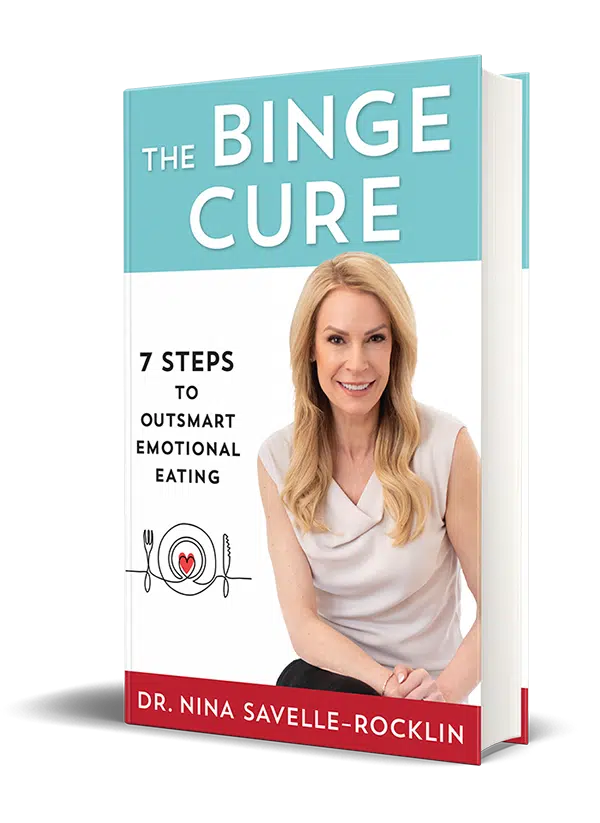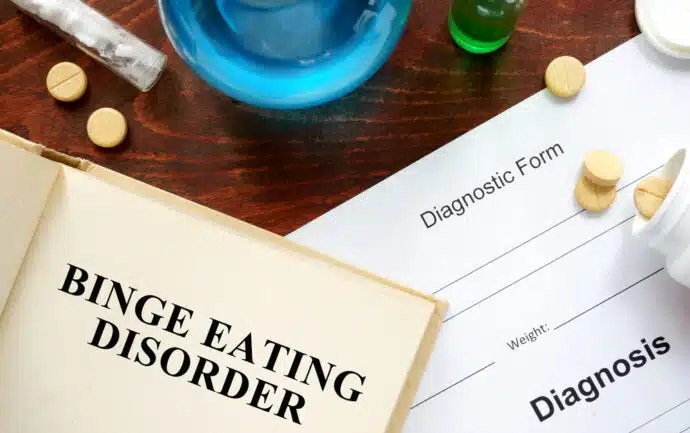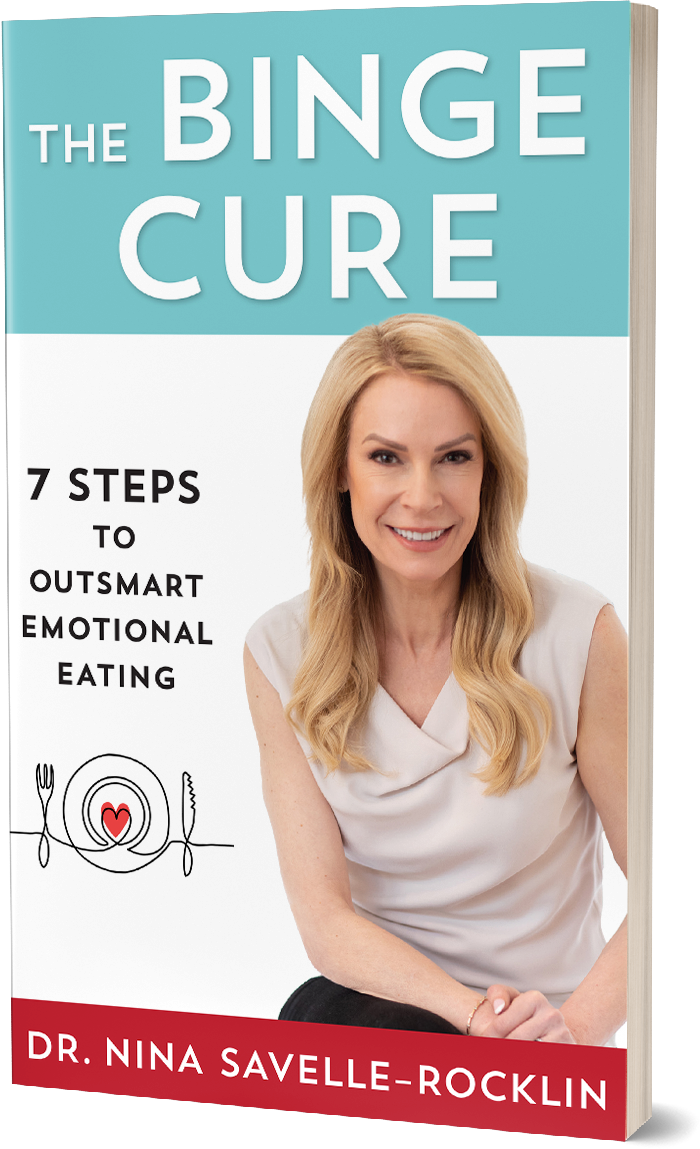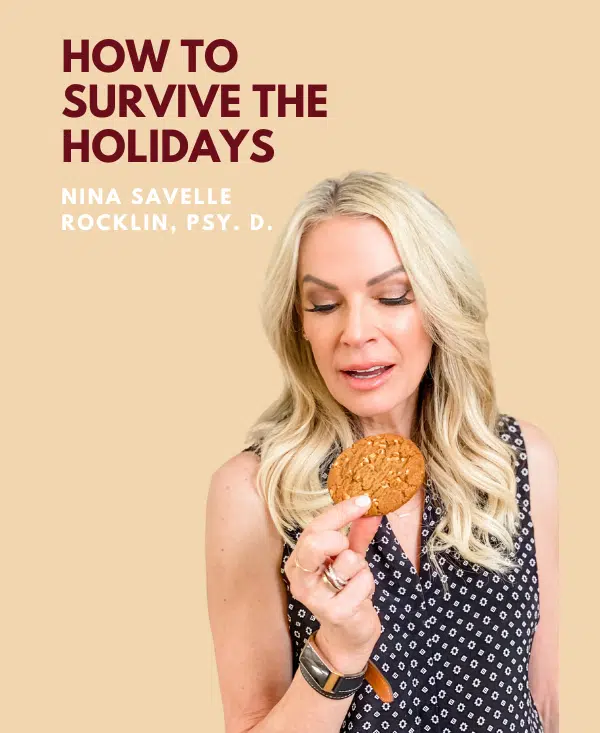Have you ever had thoughts like this?
“I’ll be happy when I lose weight.”
“When I stop binging, I’ll be happy.”
As an emotional eating therapist, I have heard that many times. Actually, the opposite is true: when we’re happy, we tend to lose weight and/or stop binge eating.
So, consider what’s stopping you from feeling happy. Are you yearning for a deeper sense of fulfillment in your life? Is something missing?
Lack of happiness can lead to feelings of emptiness, dissatisfaction, and a sense of being unfulfilled in life, which leads to eating as a way of filling the void.
In this article I will explain how to adopt a happiness mindset, addressing misconceptions about happiness and its relationship with emotional eating.
Table of Contents
- Common Misconceptions About Happiness
- How Unhappiness Helps Define Happiness
- Techniques for Developing Self-acceptance
- Strategies for Building Meaningful Connections
- The Importance of Finding Purpose and Passion in Your Life
- The Role of Boundaries in Maintaining a Happy Mindset
- Frequently Asked Questions (FAQ)
Common Misconceptions About Happiness
One prevalent misconception is that happiness is a permanent state or an end-goal. Many believe that once they achieve certain milestones — like landing a dream job, finding a soulmate, losing weight or stopping binging— they will reach a lasting state of bliss.
In other words, you’ll be happy when you stop binging. The reality is that when you get happier, you’ll stop binging. Happiness is not a destination but a journey, involving continuous effort and adaptation.
Another common misunderstanding is that happiness is solely the result of external circumstances. While achievements and external factors can influence our mood temporarily, as an emotional eating therapist, I recommend focusing on our thoughts and attitudes.
Activities like savoring everyday moments, and nurturing social connections can significantly boost your happiness levels.
It’s also easy to fall into the trap of comparing your happiness to others. Social media often presents a curated, idealized version of people’s lives. Such comparisons can lead to feelings of inadequacy and dissatisfaction.
Instead, redefine happiness by focusing on your own values and what truly matters to you. Genuine happiness often stems from living in alignment with your own goals and principles rather than trying to meet societal standards.
- To redefine happiness for yourself, start by letting go of these misconceptions.
- Understand that happiness is a dynamic, evolving process rather than a static achievement.
- Engage in happiness-boosting activities, cultivate positive internal habits, and place greater value on intrinsic goals over extrinsic rewards.
By shifting your mindset, you open the door to a more fulfilling and authentic sense of joy.
How Unhappiness Helps Define Happiness
Happiness and unhappiness are often seen as two sides of the same coin. To truly appreciate and recognize happiness, one must have experienced unhappiness. This contrast helps us understand and value positive emotions when they arise.
Experiencing unhappiness provides a reference point. Without moments of sadness, frustration, or disappointment, it would be challenging to identify and appreciate moments of joy, contentment, and satisfaction. The lows make the highs more noticeable and meaningful.
Unhappiness can serve as a catalyst for personal growth and self-awareness. When we face difficult emotions, we are often prompted to reflect on our lives, our choices, and our values. This introspection can lead to a deeper understanding of what truly brings us happiness.
Binge eating is often a coping mechanism for dealing with unhappiness or difficult emotions. When faced with feelings of sadness, loneliness, or stress, we might turn to food to numb or escape these uncomfortable feelings.
However, this temporary relief is often followed by feelings of shame, guilt, and even more unhappiness, creating a vicious cycle.
By learning to accept and process difficult emotions, we stop using binge eating as a coping strategy. This ultimately leads to a greater sense of emotional well-being and happiness.
Emotional resilience is built through experiencing and overcoming unhappiness. This resilience allows us to handle future challenges more effectively and maintain a positive mindset.
Knowing that we can navigate through tough times gives us confidence and a sense of empowerment. Unhappiness can highlight areas of our lives that need change or improvement.
It signals that something is not aligned with our values or desires. As an emotional eating therapist, when I help clients address these areas, they create more fulfilling and happy lives.
The human experience is inherently dynamic, and filled with a range of emotions. Embracing both happiness and unhappiness as natural parts of life allows us to live more authentically. This acceptance can lead to a more balanced and contented existence.
Techniques for Developing Self-acceptance
Start by understanding that self-acceptance is the foundation of self-compassion and self-love. It’s about acknowledging and embracing all aspects of yourself without judgment.
- Self-Reflection: One effective method is through self-reflection. Set aside time regularly to contemplate your thoughts and emotions. Ask yourself questions like, “What am I proud of?” and “What can I improve without being overly critical?” Journaling your responses can provide clarity and insight.
- Be Kind to yourself – Next, practice self-compassion by being kind to yourself, especially during times of failure or stress. Instead of being your harshest critic, aim to be your own best friend. One powerful technique is the self-compassion break, developed by Dr. Kristin Neff who is an expert in self-compassion. When you’re experiencing difficulty, pause, take a deep breath, and silently repeat phrases like, “This is a moment of suffering,” “Suffering is a part of life,” and “May I be kind to myself.”
- Engage in fulfilling activities: Engaging in activities that bring joy and satisfaction can also significantly enhance your sense of self-love. Whether it’s pursuing a hobby, spending time in nature, or something else you find fulfilling, these activities can help you reconnect with yourself and cultivate a deep appreciation for who you are.
Building self-acceptance, compassion, and love is a journey. It’s about taking small, consistent steps in the right direction and celebrating your progress along the way.
Strategies for Building Meaningful Connections
Strong social support can be crucial to help liberate yourself from emotional eating. Building genuine connections can provide a sense of belonging and reduce feelings of isolation that may trigger binge eating.
Relationships are the bedrock of our emotional and psychological well-being. To build meaningful connections, it’s crucial to prioritize quality over quantity.
Start by investing time in those who matter most to you. Consistent, genuine interactions can significantly enhance your bonds, whether it’s a weekly coffee catch-up with a friend or a monthly get-together.
- Be present and engaged: In an age of distractions, giving someone your full attention is a rare and precious gift. Put away your phone, make eye contact, and actively listen when others speak. Your presence and attentiveness can foster deeper connections and convey that you truly value the other person.
- Express appreciation: A simple “thank you” can go a long way. Regularly acknowledging and appreciating the efforts of those around you doesn’t just make them feel good—it also strengthens your relationship. Make it a habit to express your gratitude for the little things and the big moments alike.
- Share experiences and create memories: Shared experiences can create strong, lasting bonds. Engage in activities you both enjoy, or try something new together. Whether it’s traveling, attending a concert, or even just watching a movie, these shared moments can become cherished memories that build your relationship’s foundation.
- Open up and be vulnerable: Genuine relationships are built on trust and authenticity. Don’t be afraid to share your thoughts, feelings, and experiences. Being open and vulnerable can pave the way for deeper understanding and a more profound connection.
Last, keep in mind that the best relationships are a two-way street, based in mutuality, so letting others be there for you actually builds trust and strengthens your bond.
The Importance of Finding Purpose and Passion in Your Life
Purpose and passion in your life provide a reason to wake up with energy and enthusiasm every day. They anchor you, offering a clear direction and meaning, especially during challenging times.
This isn’t just about grandiose goals; it’s about recognizing that your daily actions and choices align with your deeper values and desires.
The benefits of having a clear purpose are immense. People who engage in meaningful work experience higher levels of satisfaction and well-being. A sense of purpose fuels resilience, helping you navigate life’s inevitable bumps with grace and determination.
One practical way to discover your purpose is by reflecting on the activities that make you lose track of time.
These ‘flow’ activities indicate areas where your passion lies. Whether it’s writing, gardening, coding, or mentoring, these moments of deep engagement are clues to your true calling.
Besides those activities, consider whether there are causes or issues you’re deeply passionate about. Dedicating yourself to a cause larger than yourself can provide profound fulfillment and a sense of belonging.
This approach not only enhances personal happiness but also fosters a sense of community and shared purpose.
Discovering your purpose is a journey, not a destination. It may require patience and self-exploration, but the rewards of living a purpose-driven life are worthwhile.
Embrace this journey with an open heart and mind, and allow your passions to guide you toward a life of meaning and joy.
The Role of Boundaries in Maintaining a Happy Mindset
For managing stress and other emotions that may trigger binge eating episodes, establishing healthy boundaries and practicing self-care can be game-changers.
It’s all about taking care of yourself and setting limits to protect your emotional well-being. Self-care isn’t just about pampering yourself with spa days and bubble baths, though those can certainly be enjoyable and beneficial.
At its core, self-care involves taking deliberate actions to nurture your physical, emotional, and mental well-being. It’s about recognizing your own needs and actively taking steps to meet them.
One powerful way to maintain a positive mindset through self-care is by establishing healthy boundaries. Boundaries are the invisible lines that protect your emotional space, ensuring you don’t overextend yourself and compromise your well-being.
They help you communicate your limits to others and encourage respect in your relationships. Consider the practice of saying “NO” when you need to.
It’s a small but potent act of self-preservation. By politely declining additional responsibilities, social engagements, or favors when you’re already stretched thin, you honor your own needs and prevent burnout.
Integrate routines and habits that promote relaxation in your daily life. Whether it’s through journaling, exercise, or simply taking a few moments to breathe deeply, these practices can rejuvenate your spirit and enhance your resilience against stress.
Self-care and boundaries look different for everyone. What matters is finding what works best for you and committing to it consistently. By doing so, you’ll cultivate a more positive and balanced mindset, allowing you to thrive both personally and in your relationships.
Embracing a happiness mindset is a journey, not a destination. It’s about gradually shifting your perspective, practicing self-acceptance, and fostering meaningful relationships. Implementing small, consistent changes can make a world of difference.
Remember to be patient with yourself and celebrate each step forward, no matter how small. Your path to happiness is unique—honor it, nurture it, and let it lead you to a lasting sense of wellbeing.
Frequently Asked Questions (FAQ)
In this section, I’ll address common questions and misconceptions about emotional eating and the pursuit of happiness. Whether you’re seeking to understand the connection between emotions and eating habits, or looking for practical strategies to cultivate self-acceptance and meaningful connections, this FAQ provides valuable insights and guidance.
1. What is an emotional eating therapist, and how can they help me?
An emotional eating therapist specializes in addressing the psychological and emotional factors that contribute to overeating. They help clients identify and understand the underlying emotional triggers for their eating habits, offering strategies to develop healthier coping mechanisms.
By focusing on emotions rather than food, they guide clients towards a happier, more balanced life, which can naturally reduce binge eating behaviors.
2. Why does happiness affect my eating habits?
Happiness and emotional well-being play a significant role in our eating habits. When we are unhappy, we often turn to food for comfort, leading to emotional eating or binge eating.
Conversely, cultivating happiness can reduce the urge to use food as an emotional crutch. Happier individuals are more likely to have balanced, healthy eating habits because they are less likely to eat in response to negative emotions.
3. What are some common misconceptions about happiness?
Many people believe that happiness is a permanent state or an end-goal, achievable only through certain milestones like losing weight or stopping binge eating. However, happiness is a dynamic, ongoing process that involves continuous effort and adaptation.
It’s also commonly misunderstood that happiness is solely derived from external circumstances, while in reality, it’s heavily influenced by our internal thoughts and attitudes.
4. How can I build self-acceptance and self-compassion to improve my happiness?
Building self-acceptance and self-compassion involves several practices:
- Self-Reflection: Regularly contemplate your thoughts and emotions to understand and accept yourself better.
- Self-Compassion Breaks: Use techniques like those developed by Dr. Kristin Neff to be kind to yourself during difficult times.
- Engaging in Fulfilling Activities: Pursue hobbies or activities that bring joy and satisfaction to enhance your sense of self-love and appreciation. These practices help you embrace all aspects of yourself without judgment, fostering a deeper sense of happiness.
5. How can establishing boundaries and practicing self-care help with emotional eating?
Establishing healthy boundaries and practicing self-care are crucial for managing stress and emotions that may trigger emotional eating. Boundaries protect your emotional space and prevent overextension, while self-care nurtures your physical, emotional, and mental well-being.
Simple acts like saying “no” when necessary, engaging in relaxing routines, and ensuring you meet your own needs can significantly reduce stress and emotional eating, leading to a happier and more balanced life.
Get 'The Binge Cure: 7 Steps to Outsmart Emotional Eating'

The Author

Dr. Nina Savelle-Rocklin is a renowned author and podcast host and one of the nation’s leading psychoanalysts known for the psychology of eating. Her signature message of, “It’s not what you’re eating, it’s what’s eating ‘at’ you” has resonated with hundreds of thousands of listeners from around the globe in 40 countries. As founder of The Binge Cure Method, she guides emotional eaters to create lasting food freedom so they can take back control of their lives and feel good in their bodies.
Related Blogs















